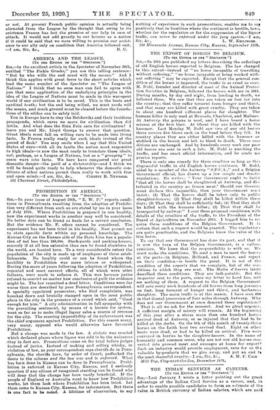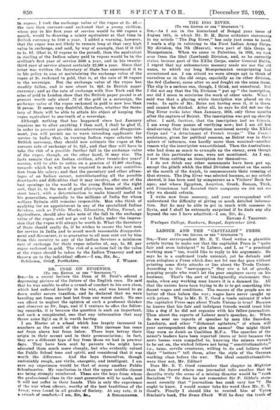THE INDIAN SERVICES AS CAREERS. (To THE EDITOR or THE
" SPECTATOR.") Sus,—Last January I wrote a letter pointing out the great advantage of the Indian Civil Service as a career, and, in order to enable possible candidates to form an estimate of the value in British currency of Indian salaries, which are paid in rupees, I took the exchange value of the rupee at 2s. 4d.— the rate then current—and reckoned that a young civilian, whose pay in his first year of service would be 600 rupees a month, would be drawing a salary equivalent at that time in British currency to £840 a year. I added a warning, however, that the rupee was not likely to remain long at that very high value in exchange, and said, by way of example, that if it fell to is. 8d. (that is, 12 rupees to the pound), then the equivalent in sterling of the Indian salary paid in rupees would be in the civilian's first year of service £600 a year, and in his twenty- third year of service almost certainly £2,500 a year. Since that letter was written the Secretary of State has announced it to be his policy to aim at maintaining the exchange value of the rupee at 2s. reckoned in gold, that is, at the rate of 10 rupees to the sovereign. But the exchange value of the rupee has steadily fallen, and is now about 1s. 84d. in British paper currency; and as the rate of exchange with New York and the sales of gold in London show that the British paper pound is at present worth only about .72 of the gold in a sovereign, the exchange value of the rupee reckoned in gold is now less than 15 pence. It seems very doubtful, therefore, whether the Score- tary of State will be able to attain his object of keeping the rupee equivalent to one-tenth of a sovereign.
Although nothing that has happened since last January requires me to alter anything I then said, I shall be glad if, In order to prevent possible misunderstanding and disappoint- ment, you will permit me to warn intending applicants for service in India that, in turning Indian rupee salaries into British currency, they should now estimate the rupee at the current rate of exchange of Is. 8)d., and that they will have to take the risk of a possible further fall in the exchange value of the rupee, though, on the other hand, it may rise. The facts remain that an Indian civilian, after twenty-five years' service, will be able to retire on a pension of £1,000 sterling, towards which he will not be required to make any contribu- tion from his salary; and that the pecuniary and other advan- tages of an Indian career, notwithstanding all the possible drawbacks and difficulties that it may involve, offer one of the best openings in the world to the young Briton of the right sort, that is, to the man of good physique, keen intellect, and stout heart, with a determination to make himself useful in his generation, especially to the millions of India for whose welfare Britain still remains responsible. Men who think of applying for an appointment in any of the specialized Indian Services, such as Public Works, Education, Police, Forest, or Agriculture, should also take note of the fall in the exchange value of the rupee, and net go out to India under the impres- sion that the rupee will always be worth 2s. What the Secretary of State should really do, if he wishes to secure the best men for service in India and to avoid much reasonable disappoint- ment end discontent, is to guarantee to all men sent out by him from this country to any of the Indian Services a minimum rate of exchange for their rupee salaries of, say, ls. 6d. per rupee reckoned in gold. The risk of a serious fall in the value of the rupee should be taken by the Indian Treasury and not thrown on to the individual officer.—I am, Sir, to., Ochilvimo, Crieff, Perthshire. J. WILSON.



































 Previous page
Previous page